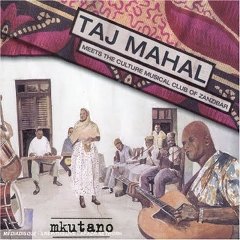Taj Mahal - Mkutano (2005)
Taj Mahal - Mkutano (2005)

1. Dhow Countries - 7:47 2. Muhoga Wa jang'ombe - 6:11 3. Zanzibar - 2:57 4. Catfish Blues - 6:23 5. Naahidi Kulienzi - 5:53 6. Mkutano - 3:55 7. Done Changed My Way Of Living - 5:29 8. M'Banjo - 3:26 9. Mpunga - 6:07 Musicians: Taj Mahal (vocals, guitar, banjo), Bill Rich (electric bass), Kester Smith (drums).
Taj Mahal goes Zanzibar. As early as the first few bars of the opening song “Dhow Countries” it becomes evident that Taj Mahal’s latest African journey is a musical winner. Not only did he take his blues to a place that is the stuff of myth and fantasy, this East African island just off the coast of Tanzania has been capturing the man’s imagination and spirit in a profound kind of way. “Dhow Countries” is a slow and meditative blues in a minor key. A tender evocation of African moods with lots of feeling, enhanced by the sounds of the Culture Musical Club of Zanzibar, the first and foremost taarab orchestra of Zanzibar.
„Muhoga wa jang’ombe“ is next and presents the Culture Musical Club in full glory. Taarab music from Zanzibar still stands as a musical universe in itself, a one-of-a-kind combination of Arabic, African and Asian musical traditions. There doesn’t seem to be anything like it anywhere else and it‘s richness has never been fully revealed or analysed, it seems. The orchestra is set up in various sections that mirror the eventful cultural and social history of Zanzibar. First of all there’s a powerful Arabian section consisting of qanun (cittern), oud (Arabic lute), nai (flute) and a number of violins. Especially the latter allude to the tradition of Egyptian film orchestras and also the traditions of Western and Indian classical music. Accordions and double bass are in the mix as well and the percussion department mostly consists of dumbak and bongos. On top of all this instrumental richness, there are the voices: male and female solo singers and choruses. To this day, the Culture Musical Club plays an essential part in the island’s cultural and social life. It’s a sort of „national orchestra“ and it has more or less single-handedly created the sounds of contemporary taarab from Zanzibar. The orchestra still provides a center of social activities for people in an environment of communication and music.
The three African-Americans on board go way back by now: Taj Mahal (vocals, guitar, banjo), Bill Rich (electric bass) and Kester Smith (drums). These three African-Americans always seem to enjoy plunging into a musical culture that’s different from the West in as much as it’s not been totally commerzialised and put on the marketplace for immediate consumption. Despite touring internationally, this orchestra from Zanzibar is still hanging on to its original identity as keeper of social traditions. No elaborate wedding ceremony in Zanzibar is complete without their musical contribution. It sure is a long way from the juke joints of Mississippi or the clubs of Chicago, indeed, but any blues scholar will be able to come up with some striking similarities concerning the social importance the blues has played for the people in past times, especially for the African-American community. But despite the many cultural differences of the two groups of musicians involved, a wonderful breaching of the gap occured. Taj Mahal took his blues – and the African-born banjo – to this remote African island of legendary and mythic stature. A place where the music has kept some mystery, it seems.
Some local heroes also took part. Female singer Bikidude is well into her nineties and a living legend - the most famous musical ambassador from Zanzibar. Next to her musical prowess, the myth of Bikidude is based on a number of real-life incidents. At the age of thirteen she fled from an enforced marriage into Tanzania, where she crossed the country barefoot. She left a second unhappy marriage and took a traditional dhow sailing-boat to Egypt. It was there she became a singer. She took off her veil and shaved her head. Thus, she created an alternative and somewhat provocative new role model for Islamic women in Zanzibar. Bikidude drank and smoked, she flirted and danced, she sang and played the drums. A major artist from Zanzibar still and singing on this album.
Taj Mahal is still a restless man. His career has exceeded a forty-year time-span by now and he’s been a recording artist for just a little less. His discography feature more than three dozen albums. His classic credo is still valid: “In the end, ultimately, the music plays you, you don’t play the music.” The man is more than just a performer – he’s also a receiver. The spirits of the ancestors have been working their way into his new project again. The meeting place is a spiritual terrain on which everyone taking part seems to be moving. Even a very secular song like “Catfish Blues” seems to be infused by these spirits, creating a unified and unifying concord of souls. This is even more evident in a song like “Naahidi Kulienzi”, Taj’s duet with singer Makame Faki.
Despite this fascinating unity of spirit, the search for the all-important moment of truthful musical communication becomes audible as well. But even this struggle provides valuable moments of musical authenticity. When Mahal’s banjo and the orchestra’s violins embark on a journey through the pentatonics of the blues („M’Banjo“), the listener becomes a witness to the process of finding mutual musical linguistics. TAJ MAHAL MEETS THE CULTURE MUSICAL CLUB OF ZANZIBAR presents another fascinating chapter of Taj Mahal’s ongoing musical journey to the source – nothing more and nothing less. It will not be his last. The search goes on. ---tradition-moderne.com
download: uploaded anonfiles mega 4shared mixturecloud yandex mediafire ziddu
Zmieniony (Poniedziałek, 08 Lipiec 2013 16:28)








